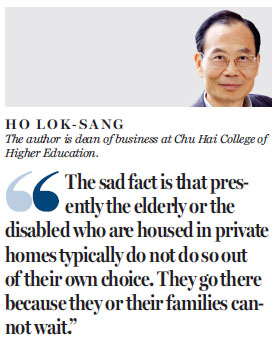Hong Kong needs more subvented care homes for its disabled people
Updated: 2016-10-25 07:36
By Ho Lok-sang(HK Edition)
|
|||||||||
Nursing homes for the elderly and residential care homes for persons with disabilities (RCHDs) are costly to run everywhere. But for Hong Kong, an affluent society which has been running a large fiscal surplus for most years in the past, there is little reason to tolerate inhumane, poorly run, and even dangerous homes.
Regrettably, scandals related to these homes have been non-stop in the past few years. Elderly residents have been found naked or half-naked waiting their turn for showers in an open-air podium for up to 90 minutes. Untimely fatalities in homes for the handicapped have occurred through suicides or accidents. Alleged sexual assaults or rapes have been reported. Most scandals took place in privately run, for-profit homes. An important question is: Why do we have such homes?
One answer that unfortunately does not hold water: As Hong Kong is a free economy, people should be allowed to run these homes for profit as long as they are able to meet the standards required, which are supposed "to ensure that residents of RCHDs receive services of acceptable standards physically, emotionally and socially". This seems reasonable enough, except that the qualifier mentioned herein has never been met, and there is little chance the specified conditions can be met unless fees are raised dramatically. As I pointed out in an earlier article in this column, some 85 percent of 310 RCHDs all over Hong Kong failed to get the legally required license to operate. They have been allowed to operate under a certificate of exemption and are supposed to be upgraded within a reasonable time frame.

The sad fact is that presently the elderly or the disabled who are housed in private homes typically do not do so out of their own choice. They go there because they or their families cannot wait. The queue for a place in a subvented home is just too long. This is especially the case for those with disabilities. The wait for a home for those with moderate mental handicap is such that the person recently at the top of the queue had been waiting since June 2003. According to legislator Fernando Cheung, the wait for someone with a severe mental handicap is about 14-15 years, while for those with a physical handicap it is about 15-16 years.
To me, if a private home is to operate alongside publicly funded homes, the only legitimate justification in an affluent society like Hong Kong is that they are superior to publicly funded homes in some way. In such a case, those who go there do so by choice. Unfortunately, in practice they are far inferior to publicly funded homes, and they also cost more. People go there, or families let their loved ones go there, only because they have no other choice.
In an article on the same subject on Aug 29 this year I pointed out: "When (people go to a private home for the handicapped), instead of paying up to HK$2,000 a month they will have to pay HK$5,000 to HK$7,000 a month. Instead of having a subvention of about HK$15,000 per head in addition to the HK$2,000 fee, for-profit homes need to make do with only around HK$6,000 a month and still come up with a profit. No wonder residents in such homes find living there inhospitable." Most commentators find that the stipulated minimum manpower requirements are already too low. What adds to the absurdity is that some private homes fail to meet these minimum requirements, and pretend that they do by putting the names of "shadow employees" on the staff list.
Compared to nursing homes for the elderly, RCHDs seem to have been neglected. The Social Welfare Department (SWD) has been purchasing places in private homes for the elderly under the Enhanced Bought Place Scheme since 1998. This has helped upgrade the service standards of these homes through enhanced service requirements in terms of staffing and space standard. But there is no comparable scheme for RCHDs. Is it because there is an Elderly Commission but no Commission for the Disabled? Perhaps we need an official advocacy commission to guard the interests of the disabled.
Actually the pressures on families with mental or physical handicaps are immense, and their need for support is definitely stronger than that of the elderly. After all, aging is inevitable and, psychologically, people are better prepared for the challenges of aging than for those arising from caring for a moderately or severely handicapped child. Moreover, the pressures on parents get ever heavier as they age. We have had multiple incidents of a handicapped child staying around the corpse of an elderly caregiver who had died. One of the worst nightmares of an aging parent is dying without knowing who will take care of a handicapped child who is unable to care for himself.
It seems clear to me that Hong Kong needs more subvented RCHDs. Before the new supply comes in, Hong Kong needs to introduce a bought place scheme for private RCHDs and more effective regulation of these homes. Allowing substandard homes another term with "exempt status" to operate, as is suggested by the SWD, is to extend the ongoing suffering for another term.
(HK Edition 10/25/2016 page10)